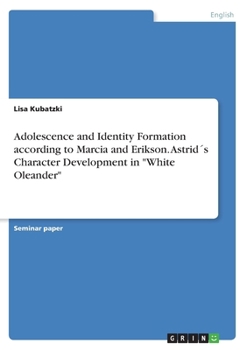Adolescence and Identity Formation according to Marcia and Erikson. Astrid´s Character Development in "White Oleander"
Seminar paper from the year 2018 in the subject American Studies - Comparative Literature, grade: 2,0, Humboldt-University of Berlin (Institut für Anglistik und Amerikanistik), course: American Identities, language: English, abstract: In this paper, I aim to reflect on psychosocial theorists Marcia and Erikson's ideas about identity formation in adolescence and prove the validity of their theories with help of the movie. I will point out that individuals can go through all of the statuses Marcia proposes in his theory, namely foreclosure, moratorium, and identity diffusion, in order to reach an identity achieved. The character of teenage daughter Astrid in the movie White Oleander is a perfect example of how an individual's identity is con- and reconstructed throughout the age of adolescence. James Marcia's model of the four identity formation statuses, as well as Erik Erikson's theory on identity formation during adolescence, is evident throughout different stages of her story. As a child of a manipulative mother, Astrid develops from a mirrored copy of her mother to a self-determined, independent adult, despite being confronted with different obstacles and troubles along her way. I will show that, apart from adolescence being a time of extreme change and conflicts by itself, being confronted with different lifestyles in Astrid's case of different foster families, and the ultimate abandonment of parental ideologies and values will lead to an independent identity. As it would go beyond the scope of this paper, I will not go into further detail about critical views on Marcia and Erikson's concepts. Especially Erikson who has published his theory of the different stages of the life cycle during the 1950s to the 1980s, was critically reviewed by feminist theorists, object relations theorists and orthodox psychoanalytic theorists. Generally, his theory was criticized for being "too Freudian" as the basis for his concept is Sigmund Freud's concept of ego, superego
Format:Paperback
Language:English
ISBN:3346238393
ISBN13:9783346238399
Release Date:September 2020
Publisher:Grin Verlag
Length:22 Pages
Weight:0.09 lbs.
Dimensions:0.1" x 5.8" x 8.3"
Related Subjects
Language ArtsCustomer Reviews
0 rating





